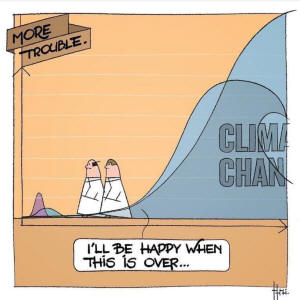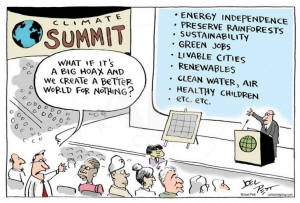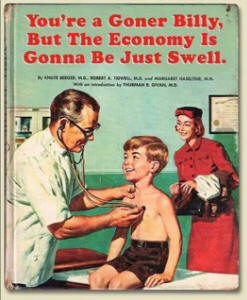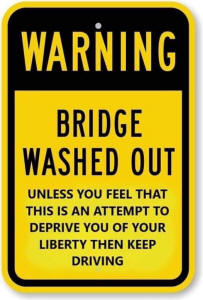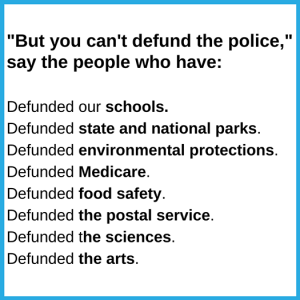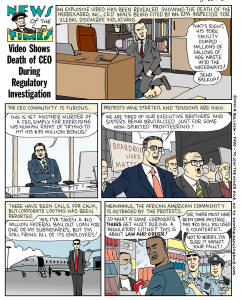PREGNANT PAUSE
— Remarks on the Corona Crisis —
We were already living in a general global crisis, but most people were only vaguely aware of it since it was manifested in a confusing array of particular crises — social, political, economic, environmental. Climate change is the most momentous of these crises, but it is so complicated and so gradual that it has been easy for most people to ignore it.
The corona crisis has been sudden, undeniable, and inescapable. It is also taking place in an unprecedented context.
If this crisis had taken place fifty or sixty years ago, we would have been totally at the mercy of the mass media, reading about it in newspapers or magazines or sitting in front of a radio or television passively absorbing whatever instructions and reassurances were broadcast by politicians or newscasters, with scarcely any opportunity to respond except perhaps to write a letter to the editor and hope that it got printed. Back then, governments could get away with things like the Gulf of Tonkin incident because it was months or years before the truth eventually got out.
The development of social media during the last two decades has of course dramatically changed this. Although the mass media remain powerful, their monopolistic impact has been weakened and circumvented as more and more people have engaged in the new interactive means of communication. These new means were soon put to radical uses, such as rapidly exposing political lies and scandals that previously would have remained hidden, and they eventually played a crucial role in triggering and coordinating the Arab Spring and Occupy movements of 2011. A decade later, they have become routine for a large portion of the global population.
As a result, this is the first time in history that such a momentous event has taken place with virtually everyone on earth aware of it at the same time. And it is playing out while much of humanity is obliged to stay at home, where they can hardly avoid reflecting on the situation and sharing their reflections with others.
Crises always tend to expose social contradictions, but in this case, with the intense worldwide focus on each new development, the revelations have been particularly glaring.
The first and perhaps most startling one has been the rapid turnabout of governmental policies. Since the usual “market solutions” are obviously incapable of solving this crisis, governments are now feeling obliged to resort to massive implementation of the kinds of solutions they previously scorned as “unrealistic” or “utopian.” When anybody, rich or poor, native or foreign, can spread a deadly disease, anything less than free healthcare for all is self-evidently idiotic. When millions of businesses are closed and tens of millions of people are thrown out of work and have no prospect of finding a new job, the usual unemployment benefits are obviously hopelessly inadequate and policies like universal basic income become not just possible, but virtually unavoidable. As an Irish satirical website put it: “With private hospitals being taken into public ownership, increased welfare supports for the vast majority of the nation and a ban on evictions and the implementation of a rent freeze, Irish people are still trying to comprehend how they woke up today to find themselves in an idyllic socialist republic.”
Needless to say, our situation is actually far from idyllic. Although Ireland and many other countries have indeed implemented these kinds of emergency measures, when we look closer we find that the usual suspects are still in charge, with their usual priorities. Particularly in the United States, where the first to be rescued were the banks and corporations, as several trillion dollars were pumped into the financial markets without the slightest public debate. Then, when it became apparent that a more general bailout was needed, the vast majority of that bailout money also went to those same huge companies; much of the smaller amount designated for small businesses was snapped up by large chains before most of the actual small businesses got a penny; and the allotment for ordinary working families and unemployed people was a one-time payment that would scarcely cover two weeks of typical expenses. To add a twist of the knife, governors in several states have come up with the clever idea of prematurely reopening certain businesses, thereby making those workers ineligible for unemployment benefits if they refuse to endanger their lives.
The point of such bailouts is that certain industries are supposedly so essential that they need to be “saved.” But the fossil fuel industries don’t need to be saved, they need to be phased out as soon as possible. And there’s no reason to save the airlines, for example, because if they go bankrupt they can then be bought for pennies on the dollar by someone else (preferably the government) and restarted with the same workers, with the losses being borne by the previous owners. Yet these immensely wealthy and grossly polluting industries and others like them are getting hundreds of billions of dollars of “crisis relief.” But when it comes to things that lower- and middle-class people depend on, suddenly the message is: “We need to tighten our belts and not increase the federal debt.” Thus, Trump continues to push for a payroll tax cut (which would sabotage Social Security and Medicare) and he has threatened to veto any bailout that gives any assistance to the U.S. Postal Service (though UPS and Fedex have already been given billions of dollars of taxpayer money). The Republicans have tried for decades to bankrupt and privatize the Post Office — most blatantly in their 2006 act requiring the Post Office to fund its employees’ retirement benefits 75 years in advance (something no other entity, public or private, has ever been obliged to do) — but Trump’s particular vehemence on this topic at this time is due to his desire to prevent the possibility of mail-in voting in the coming election.
It shouldn’t take a genius to realize that the people at the lower end of the scale should be prioritized. Not only do billion-dollar corporations not need any more money, if they get more money most of it does not “trickle down” but is salted away in offshore tax shelters or used for stock buybacks. Whereas if each lower- and middle-class person gets, say, $2000 a month for the duration of the crisis (which would cost the government much less than the current bailouts of the super-rich), virtually all of that money will immediately be spent for basic needs, which will help at least some small businesses to remain in business, which will enable more people to keep their jobs, and so on. Small businesses also need immediate assistance (especially if they have been temporarily forced to suspend operation during the crisis) or they are likely to go bankrupt, in which case large businesses and banks will buy them up at bargain rates, thereby exacerbating the already extreme gap between a few mega-corporations at the top and everybody else at the bottom.
The corona crisis has exposed many national governments as criminally negligent, but most of them have at least attempted to deal with it in a somewhat serious manner once they realized the urgency of the situation. This has unfortunately not been the case in the United States, where Trump first declared that the whole thing was just a hoax that would soon blow over and that the death count would be “close to zero,” and then, when after doing virtually nothing for more than a month he was finally forced to admit that it was actually a serious crisis, announced that thanks to his brilliant leadership “only” around 100,000 or 200,000 Americans will die. Months into the pandemic there is still no national stay-at-home order, no national testing plan, no national procurement and distribution of life-saving medical supplies, and Trump continues to downplay the crisis in a frantic effort to open things up soon enough to revive his reelection chances.
Since his dillydallying has already been responsible for tens of thousands of additional deaths, and since he is also presiding over an economic chaos not seen in America since the Great Depression of the 1930s, the Democrats should normally have no trouble in defeating him in November. But as it did four years ago, the Democratic Party establishment has demonstrated once again that it would rather risk losing to Trump with a business-as-usual corporate tool than risk winning with Bernie Sanders. Sanders’s programs (Medicare for All, Green New Deal, etc.) were already popular with most voters, and they have become even more so as the corona crisis has made the need for them more obvious. The fact that such commonsensical reforms are seen as radical is just a reflection of how cluelessly reactionary American politics has become by comparison with most of the rest of the world.
Meanwhile, since it soon became clear to just about everyone that Trump hasn’t the dimmest idea of how to deal with the corona crisis except to showcase his amazing medical knowledge and brag about his TV ratings, everyone else has been left to deal with it on their own. Though some state and local governments have helped, it should be noted that many of the earliest, most extensive, and most creative responses have been carried out by ordinary people on their own initiative — young people doing shopping for older and more vulnerable neighbors, people making and donating the protective masks that the governments neglected to stockpile, health professionals offering safety tips, tech-savvy people helping others to set up virtual meetings, parents sharing activities for kids, others donating to food banks, or crowdfunding to support popular small businesses, or forming support networks for prisoners, immigrants, homeless people, etc.
The crisis has vividly demonstrated the interconnectedness of people and countries all over the world, but it has also revealed, for those who weren’t already aware of it, that vulnerability is not equally shared. As always, those at the bottom bear the brunt — people in prisons or immigrant detention centers or living in crowded slums, people who can’t practice social distancing and who may not even have facilities to effectively wash their hands. While many of us are able to stay at home with only mild inconvenience, others are unable to remain at home (if they even have a home) or to share so many things via social media (if they even have a computer or a smartphone) because they are forced to continue working at “essential jobs,” under dangerous conditions and often for minimum wage and no benefits, in order to provide food, utilities, deliveries, and other services for the people who are staying home. (See Ian Alan Paul’s provocative analysis of the “domesticated/connected” sector and the “mobile/disposable” sector in The Corona Reboot.)
The “mobile/disposable” workers are usually too isolated and too vulnerable to dare to struggle (especially if they are undocumented), but because most of their jobs are indeed essential, they now have a potentially powerful leverage and it is not surprising that they are starting to use it. As the dangers and stresses build up, their patience has given way, beginning with widespread wildcat strikes in Italy in March, then spreading to several other countries. In the United States protests and strikes have broken out among workers at Amazon, Instacart, Walmart, McDonald’s, Uber, Fedex, grocery workers, garbage workers, auto workers, nursing home workers, agricultural workers, meat packers, bus drivers, truck drivers, and many others; nurses and other healthcare workers have protested medical equipment shortages; workers at GE have demanded repurposing jet engine factories to make ventilators; homeless families have occupied vacant buildings; rent strikes have been launched in several cities; and prisoners and detained immigrants are hunger-striking to expose their particularly unsafe conditions. Needless to say, all these struggles should be supported, and frontline workers should be first in line in any bailout.
After months of staying at home, everyone is naturally anxious to resume some degree of social life as soon as possible. There are legitimate debates about just how soon and under what conditions it is safest to do this. What is not legitimate is to deliberately ignore or deny the dangers simply so that businesses can resume and politicians can get reelected. The most grossly illuminating revelation of the whole crisis has been seeing pundits and politicians openly declare that it’s an acceptable trade-off for millions of people to die if that’s what it takes to “save the economy.” This admission of the system’s real priorities may backfire. People have been told all their lives that this economy is inevitable and indispensable, and that if they just give it free rein it will ultimately work for them. If they start seeing it for what it actually is (a con game that enables a tiny number of people to control everyone else in the world through their possession and manipulation of magic pieces of paper), they may conclude that it needs to be replaced, not saved. “Once society discovers that it depends on the economy, the economy in fact depends on the society” (Guy Debord, The Society of the Spectacle).
In the links list below, you can find articles going into detail about these and other aspects of the crisis. But at this point I’d like to step back and look at what I consider the most significant aspect of this whole situation: the experience of the shutdown itself.
This experience is so unprecedented, and it is changing so dramatically from day to day, that we still don’t quite know what to think of it. We keep secretly hoping that we’ll wake up and discover that it was just a nightmare, but each morning it’s still here. But as we have gradually gotten at least somewhat used to it, it is offering its own revelations.
Any pause may give us time to reflect on our lives and reassess our priorities, but knowing that everyone else is doing this at the same time gives these reflections a more collective focus. This pause is shaking us out of our usual habits and presumptions and giving each and all of us a rare chance to see our lives and our society in a fresh light. As each day brings fresh news, things seem to be speeding up; yet so many things have stopped or at least drastically slowed down, it also sometimes seems like everything is in slow motion; or as if we’d all been sleepwalking and were suddenly awakened — looking around at each other in amazement at the strange new reality, and how it contrasts with what we previously considered normal.
We come to realize how much we miss certain things, but also that there are things we don’t miss. Many people have noted (usually with a half-guilty hesitation, since they are of course quite aware of the devastation that is going on in many other people’s lives) that they personally are appreciating the experience in some regards. It’s much quieter, the skies are clearer, there’s scarcely any traffic, fish are returning to formerly polluted waterways, in some cities wild animals are venturing into the empty streets. There has been much joking about how those who like quiet contemplative living are hardly noticing any difference, in contrast to the frustrations and anxieties of those who are used to more gregarious lifestyles. In any case, whether they like it or not, millions of people are getting a crash course in cloistered living, with repeated daily schedules almost like monks in a monastery. They may continue to distract themselves with entertainments, but the reality keeps bringing them back to the present moment.
I suspect that the frantic urgency of various political leaders to get things “back to normal” as soon as possible is not only for the ostensible economic reasons, but also because they dimly sense that the longer this pause goes on, the more people will become detached from the addictive consumer pursuits of their previous lives and the more they will be open to exploring new possibilities.
One of the first things that many people have noticed is that the social distancing, however frustrating it may be in some regards, is ironically bringing people closer together in spirit. As people get a new appreciation of what others mean to them, they are sharing their thoughts and feelings more intently and more widely than ever — personally via phone calls and emails, collectively via social media.
Many of the things shared are of course pretty modest and ordinary — reassuring each other that we’re doing okay (or not), comparing notes about how to deal with this or that inconvenience, recommending films or music or books we’ve been bingeing on. But people are also coming up with memes, jokes, essays, poems, songs, satires, skits. However amateurish many of these things may be, the ensemble effect of thousands of these personal expressions being shared all over the globe is in some ways more moving than watching professional performances under ordinary circumstances.
The simplest and most common social-media posts have been memes: short stand-alone statements or captions added to illustrations. In contrast to traditional political slogans vehemently for or against something, these memes typically have a more deadpan tone with an ironical twist, leaving it up to the reader to recognize the contradictions being revealed.
It is interesting to compare these memes with the popular expressions of another crisis just over fifty years ago — the graffiti of the May 1968 revolt in France. There are some obvious differences in tone and context, but in both cases there’s a marvelous mix of humor and insight, anger and irony, outrage and imagination.
The 1968 crisis was intentionally provoked. A series of protests and street fights by thousands of young people in Paris inspired a wildcat general strike in which more than ten million workers occupied factories and workplaces all over France, shutting down the country for several weeks. When you look at the graffiti, you can sense that these people were actively making their own history. They were not merely protesting, they were exploring and experimenting and celebrating, and those graffiti were expressions of the joy and exuberance of their actions.
Our present situation resembles that earlier one in the sense that suddenly everything has come to a virtual standstill, leaving people to look around at each other and wonder: What next? But during May 1968, when the government had momentarily backed off (since it was powerless in the face of the general strike), that meant: What should we do next? (Should we take over this building? Should we restart this factory under our own control?) In our more passive situation it mostly means: What’s the government going to do next? What’s the latest news about the virus?
The memes being shared during the present crisis reflect this passivity. For the most part they express people’s reactions to finding themselves in an unpleasant situation that they did not choose, let alone provoke. Some frontline workers are striking, but only sporadically, out of desperation. Virtually everyone else is staying at home. They may denounce various outrages, or advocate various policies that might make things better, or root for politicians who they hope will implement such policies, but it’s from the sidelines. Participation is limited to things like signing petitions or sending donations, though there are occasional mentions of things that people might do once they are free to go out into the streets again.
At the same time, however, millions of people are using this pause to investigate and critique the system’s fiascos, and they are doing this at a time when practically everyone else in the world is obsessively focused on the same issues. I think this first ever global discussion about our society is potentially more important than the particular crisis that happened to trigger it.
It is admittedly a very confused and chaotic discussion, taking place within the even more chaotic background noise of billions of people’s ongoing individual concerns. But the point is that anyone can take part whenever they wish and potentially have some impact. They can post their own ideas, or if they see some other idea or article they agree with, they can email the link to their network of friends or share it on Facebook or other social media, and if other people agree that it is pertinent, they may in turn share it with their friends, and so on, and within a few days millions of people may be aware of it and able to further share it or adapt it or critique it.
This discussion is of course far from being a democratic decision-making process. Nothing is being decided beyond vague fluctuations of the popularity of this or that meme or idea. If a significant global movement comes out of this crisis, it will need to develop more rigorous ways to determine and coordinate the actions that the participants feel are appropriate, and it will obviously not want its communications to depend on privately owned and manipulated media platforms as they do now. But meanwhile we have to work with what we’ve got — on this terrain where virtually everyone in the world is already connected, however superficially. It’s already a big first step that everyone is able to personally weigh in instead of leaving things to leaders and celebrities. To go further, we need to be aware that this is happening, aware that what is going on within us and among us is potentially more promising than all the farcical political dramas we are watching so intently.
These ideas may seem extravagant, but they are hardly more so than the reality we are facing. The International Labor Organization has reported that nearly half of the global workforce is now at risk of losing its livelihoods. That amounts to 1.6 billion workers out of a total of 3.3 billion — a level of social disruption far more extreme than the Great Depression of the 1930s. I have no idea what will come of this, but I don’t think that 1.6 billion people are going to meekly curl up and die so that the ruling elite’s economic con game can continue to thrive. Something is going to give.
Whatever else happens, it is clear that nothing will ever be the same again. As so many people have noted, we can’t “return to normal.” That old normal was a mess, even if some people were in sufficiently comfortable circumstances that they could tell themselves that it wasn’t all that bad. In addition to all its other problems, it was already propelling us toward a global catastrophe far worse than what we are going through now.
Fortunately, I don’t think we could go back even if we wanted to. Too many people have now seen the deadly insanity of this society too clearly. Organizing a different kind of society — a creative, cooperative global community based on generously fulfilling the needs of everyone rather than protecting the exorbitant wealth and power of a tiny minority at the top — is not simply an ideal, it is now a practical necessity. (My own views on what such a society might look like and how we might get there are set out in The Joy of Revolution.)
The coronavirus is simply one side effect of climate change (one of the many new diseases being generated by deforestation and its resulting disruption of wildlife habitats). If we don’t act now, we will soon face other crises, including other pandemics, under much more unfavorable conditions, after climate change and its associated disasters have crashed our social and technological infrastructures.
The corona crisis and the climate change crisis are very different in timing and in scale. The first one is sudden and fast-moving — every day of delay means thousands of additional deaths. The second is far more gradual, but also far more momentous — every year of delay will probably mean millions of additional deaths, along with a miserable existence for those who survive under such dystopic conditions.
But this shock we are now experiencing is also an opportunity for a new beginning. Hopefully, we may one day look back and see it as the wake-up call that managed to bring humanity to its senses before it was too late.
BUREAU OF PUBLIC
SECRETS
May 17, 2020
RECOMMENDED LINKS
When I started writing this piece a couple months ago, I
intended to discuss numerous aspects of the crisis in some detail. But as I followed the
developments, virtually every fact I was going to call attention to had
already become common knowledge within a few days, and virtually every idea I
came up with was articulated by others just as quickly. So I decided to condense my own text and
to supplement it with these links. Needless to
say, I don’t necessarily agree with all of the analyses, but I think that each
article offers some useful information or insights, and that the last
three sections present some lively examples of the countless memes and songs
and satires that have been circulating.
Special thanks to my friends and contacts on Facebook, which is where I learned of most of these items. I plan to periodically update this list. If you come across articles or memes that you think are particularly good, feel free to let me know about them.
[NOTE: Shortly after I posted this text there was an immense wave of protests in the United States and dozens of other countries triggered by the May 25 police murder of George Floyd in Minneapolis. As I continued adding links here regarding the corona crisis, I also included links to a few of the thousands of articles, videos, memes, etc. regarding that ongoing Black Lives Matter movement. In late June 2020 I stopped adding any further links. Both crises are of course continuing to develop, but I think that the links below give a pretty good idea of how things were playing out through June 2020. —KK]
I. GENERAL OVERVIEWS
Coronavirus Spells the End of the Neoliberal Era. What’s Next?
Article by Jeremy Lent, author of The Patterning Instinct: A Cultural History
of Humanity’s Search for Meaning.
Ten Premises
for a Pandemic
Ten brief theses by
Ian Alan Paul.
The Corona Reboot
Another text by the above author, notable for its analysis of the
“domesticated/connected” sector and the “mobile/disposable” sector.
Coronavirus Capitalism — And How to Beat It
Short video by Naomi Klein, author of The Shock Doctrine: The Rise of
Disaster Capitalism.
The Impossible Has Already Happened: What Coronavirus Can Teach Us About Hope
Article by Rebecca Solnit, author of A Paradise Built in Hell: The
Extraordinary Communities That Arise in Disaster.
The Coronavirus Is Rewriting Our Imaginations
Article by science-fiction writer Kim Stanley Robinson.
Corona Virus and the Collapse of Our Imagination
Short article by Jonathan Carp.
To Heal from Covid-19, We Must Imagine a Different World
Interview with authors Noam Chomsky and Robert Pollin.
Coronavirus
Remarks by Raoul Vaneigem, author of The Revolution of
Everyday Life.
The Plague and the Wrath
Article by Charles Reeve, author of Le Socialisme Sauvage.
Practicing Anarchy While the State Fiddles
Observations by San Francisco writer Chris Carlsson.
Prepare for the Ultimate Gaslighting
As noted by several people in
this online
discussion, this article by
Julio Vincent Gambuto
reflects some rather naïve notions about capitalism and American society, and
its melodramatic narrative is sometimes corny and simplistic. But it has the
merit of stressing that the “Great Pause” we are now experiencing is indeed an
unprecedented break and opportunity.
The
Pandemic Is a Portal
This article by novelist Arundhati Roy is mostly about conditions in India, but its eloquent concluding passage has already been shared and
reshared among millions of people:
“Whatever it is, coronavirus has made the mighty kneel and brought the world to a halt like nothing else could. Our minds are still racing back and forth, longing for a return to ‘normality,’ trying to stitch our future to our past and refusing to acknowledge the rupture. But the rupture exists. And in the midst of this terrible despair, it offers us a chance to rethink the doomsday machine we have built for ourselves. Nothing could be worse than a return to normality. Historically, pandemics have forced humans to break with the past and imagine their world anew. This one is no different. It is a portal, a gateway between one world and the next. We can choose to walk through it, dragging the carcasses of our prejudice and hatred, our avarice, our data banks and dead ideas, our dead rivers and smoky skies behind us. Or we can walk through lightly, with little luggage, ready to imagine another world. And ready to fight for it.”
II. ECONOMIC ISSUES
ILO: As Job Losses Escalate, Nearly Half of Global Workforce at Rish of Losing Livelihoods
America Is Committing Economic Suicide
The Plan Is to Save Capital and Let the People Die
Meatpacking Crisis Shows Limits of Human Sacrifice as Recovery Plan
Alternatives to Killing People for the Economy
No Going Back! Theses on the Pandemic
It’s Time to Reject the Gods of Commerce: America Is a Society — Not an “Economy”
Has the Time Finally Come for Universal Basic Income?
The Case for a Substantive Universal Basic Income
Stimulus Isn’t Enough. Our Cities Need a Post-Pandemic New Deal
We Need a Radically Different Model to Tackle the COVID-19 Crisis
Covid-19 Broke the Economy. What If We Don't Fix It?
The Pandemic Will Cleave American in Two
Every Aspect of the Coronavirus Pandemic Exposes America’s Devastating Inequalities
Remote Work Worsens Inequality by Mostly Helping High-Income Earners
Coronavirus Didn’t Bring the Economy Down — 40 Years of Greed and Malfeasance Did
Another Bank Bailout Under Cover of a Virus
Corporate Looting as “Rescue Plan,” Robber Barons as “Saviors”
Over 43,000 US Millionaires Will Get “Stimulus” Averaging $1.6 Million Each
The Small Business Loan Racket
Fossil Fuel Firms Linked to Trump Get Millions in Coronavirus Small Business Aid
Rich Corporations Get $500 Billion, No Strings Attached
U.S. Taxpayers’ Virus Relief Went to Firms That Avoided U.S. Taxes
What’s the Difference Between Corporate CEOs and Pigs?
Amid the Coronavirus Pandemic, America’s Billionaires Thrive and Prosper
Airlines and Oil Giants Are on the Brink. No Government Should Offer Them a Lifeline
CEO Shocks Business News Host, Says Billionaires and Bad Companies “Deserve to Get Wiped Out”
III. STRIKES, PROTESTS, MUTUAL AID
Italy Calls General Strike: “Our Lives Are Worth More Than Your Profits”
General Electric Workers Launch Protest, Demand to Make Ventilators
National Nurses United Call for Healthcare Before Profit
Farmworkers, Mostly Undocumented, Become “Essential” During Pandemic
Five Ways Immigrants Are Helping Their Fellow Americans Fight COVID-19
The Coronavirus Shock Wave Could Shift Power to Workers — For Good
Every Food and Delivery Strike Happening Now
Coronavirus Has Caused More Than 150 Strikes. This Map Is Tracking Them All
Can’t Pay, Won’t Pay: Tens of Thousands Take Part in Covid-19 Rent Strike Across US on May Day
Humanity Not Cages: Demand a Just and Humane Response to COVID-19
“The Way We Get Through This Is Together”: The Rise of Mutual Aid Under Coronavirus
Twelve Ways Communities Are Taking Care of Each Other During the Pandemic
Pandemic Resources, Tips and Mutual Aid
Resurgent Solidarity in a Time of Crisis: The New Orleans Mutual Aid Group
IV. BLACK LIVES MATTER
How We
Can Win
Short, powerful video by Kimberly Latrice Jones.
The Decline and Fall of the Spectacle-Commodity
Economy
Situationist International article on the Watts Riot of 1965.
Speaking of Looting . . . Mnuchin to Keep Covid Bailout Recipients “Confidential”
The Startling Difference Between the Minneapolis BLM Protest and Anti-Lockdown Protests
Who’s Trashing Downtown Every Night and Why?
Liberal Redneck: Minnesota Burning
The Slow Road to Sudden Change
Life and Times at the Capitol Hill Autonomous Zone
V. OTHER TOPICS
Anatomy of a Man-Made Disaster: 320 Ways Donald Trump Failed to Protect Us from the Coronavirus
Why the Billionaire Class Will Support “Coronavirus Care for All” But Never “Medicare for All”
Medicare Is Best Way to Cover the Millions of Americans Whose Health Insurance Has Been Taken Away
Why the Madman in the White House Wants to Kill the Post Office Amid a Pandemic
Vote Safely by Mail in November? Not So Fast, Say Republicans
Inside the Radical Republican War on the Post Office
Trump: No Coronavirus Aid Unless Congress Agrees to Undermine Social Security
“It’s a Sh— Sandwich”: Republicans Rage as Florida Becomes a Nightmare for Trump
Florida GOP Realizes Deliberately Impoverishing the Unemployed Has Downsides
Trump Blocks National Testing Program — Why? Because Tests Make Us “Look Bad”
We Don’t Have a President, or a Plan
Aiming Missles as Viruses: A Plea for Sanity in a Time of Plague
The Startling Difference Between the Minneapolis BLM Protest and Anti-Lockdown Protests
The Coronavirus Is a Preview of Our Climate-Change Future
There Are No Dolphins in Venice: But the Vision of a Better World May Sustain Us
A Palestinian Guide to Surviving a Quarantine
VI. SONGS
Family’s Lockdown Adaptation of Les Misérables Song Goes Viral
Dance Song for the End of the World
VII. SKITS, SATIRES, CARTOONS, ETC.
Corona Virus: Honest Government Ad
Pandemic Update: We’ve Had to Turn Off the Machine
Every Covid-19 Commercial Is Exactly the Same
This Sums Up Everything We Have Been Told So Far
Liberal Redneck: Coronavirus in America
Explaining the Pandemic to My Past Self
BBC Reporter Delivers Knock-Out Opener on Pandemic’s Unequal Impact
Ticked Off Vic: A Message to the Government
Protestors Criticized for Looting Businesses Without Forming Private Equity Firm First
Tom
Tomorrow on the Corona Crisis
Several recent cartoons by the great political satirist.
Here are two other superb cartoons, one recent and one from several years ago but still very relevant:
VIII. MEMES
World: “There’s no way we can shut everything down in order
to lower emissions, slow climate change and protect the environment.”
Mother Nature: “Here’s a virus. Practice.”
Things are not getting worse. They are getting uncovered. We must hold each other tight and continue to pull back the veil.
Also highly contagious is kindness, patience, love, enthusiasm, and a positive attitude. Don’t wait to catch it from others, be the carrier.
Nothing should go back to normal. Normal wasn’t working. If we go back to the way things were, we will have lost the lesson. May we rise up and do better.
May we grow not back to what was but instead toward what we can become.
Normal: Getting dressed in clothes you bought for work then driving through traffic in a car you’re still paying for in order to get to the job you need to pay for the clothes and the car and the house you leave vacant all day just so you can afford to sleep there.
The economy isn’t “closed.” Everyone is working diligently homemaking, cooking meals, and taking care of their loved ones. It’s just not valued by economists because it’s normally women’s unpaid labor. Have a great day at work everyone!
While you’re sanitizing and wiping everything down, be sure to wipe hatred out of your heart. That’s a virus, too.
You are watching people go through withdrawal from the emotional addiction to the myth of certainty.
The future is not what’s going to happen, but what we are going to do.
The great irony coming out of all this is that the world’s economy is in danger simply because people are only buying what they need. Think about that.
Suddenly the whole nation is depending on the very people they don’t believe should make $15 an hour.
At least once in your life you will need a doctor, a lawyer, an architect, but day after day you will need a farm worker.
People currently in their second or third home want you to get back to your second or third job.
If the economy is crashing because people can’t work, I don’t understand why the entrepreneurs don’t just create more wealth. I’ve been told for years that they are the wealth creators. What’s the matter? Do they need the workers or something?
The number of billionaires pushing for everyone to go back to work early proves one thing and one thing only. They don’t make their money. You do.
Wouldn’t it be crazy if there was a large external shock to our extractive capitalist system that proved without a shadow of a doubt that our entire economy runs on the labor of the working class, not the unseen and immeasurable genius of plucky billionaires?
Isn’t it weird that people living from paycheck to paycheck are supposed to have months’ worth of savings for emergencies while billion-dollar corporations are so poorly managed they’re on the brink of bankruptcy after a week of reduced profits?
GADFE: Grandparents Against Dying For the Economy
Capitalism 1970: “Work hard, you too can be rich.”
Capitalism 1990: “Work hard and a few crumbs will fall down.”
Capitalism 2020: “You should be willing to die in order to save the economy for
the top percent.”
Are you guys still all in for this?
Upon closer analysis I have concluded that we are not, in fact, “all in this together.”
We are not all in the same boat. We are all in the same storm.
The lockdown has demonstrated three things:
1. Our economy collapses as soon as is stops selling useless stuff to
overindebted people.
2. It is perfectly possible to greatly reduce pollution.
3. The lowest paid people in the country are the most essential to its
functioning.
In hindsight, maybe structuring our society so that the greediest, most ruthless, and most shameless self-promoters get to hold all the power and make all the decisions was a mistake.
If you made $180,000 a day since the birth of Christ, Jeff Bezos would still have more money than you.
Have you ever considered the possibility that Jeff Bezos just works 130 billion times harder than you?
Jeff Bezos now has roughly $189 billion. Average American yearly income is $32,000. How long would it take an average worker to make the amount Bezos has? 5.9 million years.
Challenge: Try to explain to me how the complex $6 trillion corporate bailout bill was better policy than taking the $6 trillion and simply giving all 157 million American workers $38,000 each?
There was a $2 trillion covid package. That works out to $6000 for every man, woman and child in the country. Actual human beings got $1200 of that. What happened to the other $4800 per person?
“Looting”? In the middle of a pandemic, Zuckerberg made $31.4 billion and Bezos made $38.4 billion. There are your looters.
What’s the difference between a ventilator and a bomb? There’s never any shortage of bombs.
Nancy Pelosi, April 2019: “When most people say they’re for Medicare-for-all, I think they mean health care for all. Let’s see what that means. A lot of people love having their employer-based insurance.” Have you polled the 10 million newly unemployed to see how they like it now, Nancy?
BIDEN: He Won’t Inject You with Bleach.
Do not under any circumstance take a disinfectant if you are currently taking Windex for windmill cancer.
The same people who said they voted for Trump because he says what he means are now telling us he doesn’t mean what he says.
America is the only place I know where you can institute a policy to save lives, watch it work, then have a large portion of the population complain that not enough people died to justify having instituted the policy.
A mob of the MAGA persuasion
Conducted a statehouse invasion.
Though heavily armed,
They parted unharmed,
And that’s how you know they’re Caucasian.
Calm down, everyone. These white dudes are just waving confederate flags, carrying assault weapons, and putting others’ lives at risk protesting their right to eat at Wendy’s . . . it’s not like they’re black athletes peacefully kneeling during a song protesting their right to live.
Folks, I feel we aren’t doing enough to provide our white men with hobbies.
Hell hath no fury like a white person mildly inconvenienced.
During the pandemic Far Right extremists have staged an armed occupation of a state capitol building while Far Left extremists are running food pantries and mutual aid organizations, but in a few months we’ll be hearing how both sides are equally violent.
The spread of Covid-19 is based on two factors:
1. How dense the population is.
2. How dense the population is.
It started as a virus but mutated into an IQ test.
Even on Gilligan’s Island they listened to the professor, not the millionaire.
Feels weird having to say this, but if you’re willing to go out and protest for haircuts and Häagen-Daz but not caged migrant children, you’re an enormous dickhead.
Did you ever notice that the Trump supporters protesting shutdowns aren’t demanding that bookstores and libraries be reopened? Why is that?
Imagine if in London during the Blitz there’d been a whole bunch of people going “I’ll turn on my lights if I feel like it.”
The parachute has slowed our rate of descent, so we can take it off now.
If you or a loved one has been refused entry to a private business for not wearing a mask and you would like to explore legal options to protect your constitutional rights, our law firm is happy to explain just how fucking stupid you are.
The first places open for regular business should be government buildings and offices. If the lawmakers aren’t ready to take those risks then what does that tell you?
They’re taking a “wait and see if you die first” approach.
We isolate now
So when we gather again
No one is missing.
We spent two decades mourning and analyzing and lamenting 3000 people from the September 11 attacks. Now, apparently, 3000 dead people a day is the price of doing business.
In the other timeline, Hillary’s impeachment trial begins today for her shameful handling of the COVID-19 crisis that has left 12 Americans dead.
They want to reopen the economy to save capitalism, because if the government was forced to distribute resources in a way that ensured our survival, they know we would never go back.
Relax. If the pandemic doesn’t kill you, Trump’s 100 environmental rollbacks probably will.
My favorite Bible story is probably the one where Jesus tells the lepers to get used to the idea that a lot of them are going to die, and then he goes on TV and brags about what a great job he’s doing.
Stock Market: A graph of rich people feelings.
I wish white people protested when a black man is murdered the way they do when they need a haircut.
“It’s easier to fool people than to convince them that they have been fooled.’’ (Mark Twain)
“All man’s misfortune comes from one thing, which is not knowing how to stay at rest in a room.” (Blaise Pascal, 1670)
One thing this pandemic has made abundantly clear: A whole lot of people simply cannot be alone with themselves. It’s telling.
Imagine if this lockdown happened 18 years ago. You would be stuck at home with a Nokia 3310 with 300 texts, 100 minutes call limit, and dial-up Internet.
Yes, lockdown poses its own mental health challenges. But can we please stop pretending that our former world of long working hours, stressful commuting, hectic crowds, shopping centers, infinite choice, mass consumerism, air pollution and 24/7 everything was a mental health utopia?
It’s amazing how we’re screwing up an apocalypse on “easy” setting. We’re clearly not ready for zombies or aliens.
Alarming Report Suggests Americans Can’t Go Much Longer Without Jobs and Haircuts Before Becoming Hippies.
Marijuana is legal. Haircuts are not. It took fifty years but the hippies have finally won.
Now that I’ve lived through an actual plague, I totally understand why Italian Renaissance paintings are full of naked fat people lying on couches.
I’m getting tired of being part of a major historical event.
Back in my day, you could eat a raw bat without causing a global crisis.
We’re fighting a billion-dollar propaganda industry with memes. How fucking cool is that!
Wear a mask! It’s in the Ten Commandments! Thou shalt not Covid thy neighbor!
Since we’re all going to die, if anyone is secretly in love with me, now is the time to speak up.
This lockdown is bringing out our innate creativity. Hard to imagine anything worse.
History essays in 2053: “Explain the use and role of memes as a coping mechanism during the Corona Virus Pandemic of 2020.”
Great news for fiscal conservatives: We can fund social services by cutting police budgets!
You’d think a country that can equip every cop like a soldier could equip every doctor like a doctor.
Even if everyone involved in every uprising in the last decade stole as much as they could out of every store they came across, it still wouldn’t be a drop in the bucket of what Wall Street has stolen through financial crises.
Looting is what filled nearly every prestigious history museum in the Western world. Are y’all anti-looting now? Are y’all returning artifacts?
I personally think it’s really cool how we all went from learning how to make banana bread to learning how to abolish the police in a matter of weeks.
Every time a cop kills someone there’s always someone saying “Oh no, he wouldn’t want all this rioting and looting.” For future reference, if I’m ever choked to death for 8 minutes by a cop for no reason, please burn down the police station.
The White House went on lockdown? Wait, why doesn’t the president “invite them in, hear what they have to say, make a deal”? That was his advice to the governor of Michigan when an armed anti-government militia stormed their statehouse.
The worst looting I’ve ever seen take place happened a few weeks ago when corporations collected over 500 billion dollars in stimulus money while everyone else was left with a $1200 check and having to decide if they pay for food or rent.
All these folks worried about erasing history when the Confederate statues come down will be thrilled to learn about the existence of books.
Extreme crisis is the mother of paradigm shift.
We are all floating on the same sea, but some are in superyachts and others clinging to drifting debris.
Lockdown can only go four ways. You’ll come out a monk, a hunk, a chunk, or a drunk. Choose wisely.
Article on the coronavirus crisis by Ken Knabb, with links to other articles, songs, memes, etc.
No copyright.
Spanish translation of this
text
French translation of this
text
